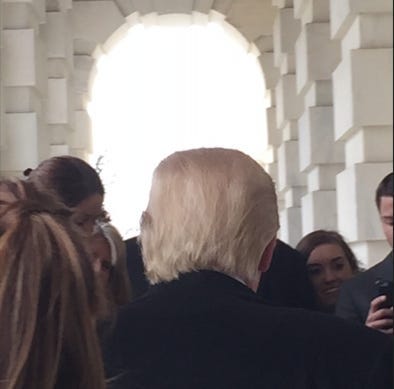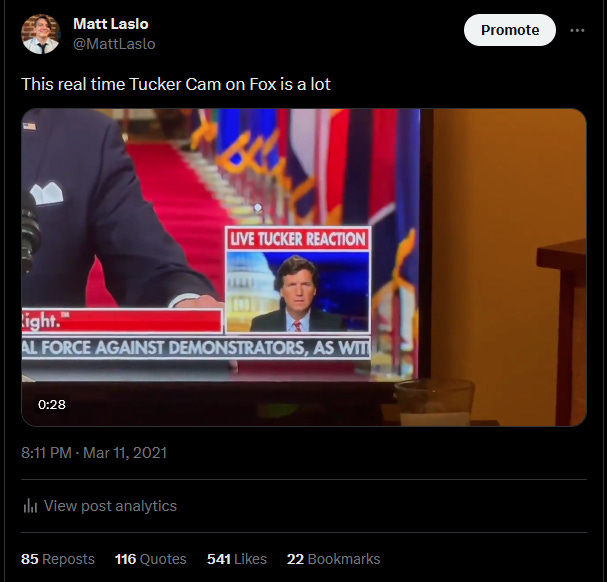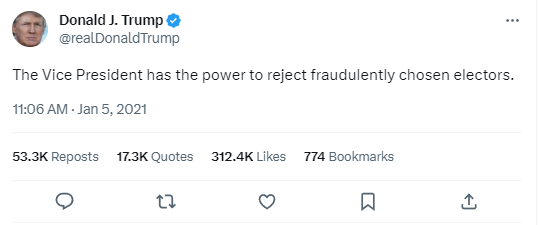Trump’s Fulton County indictment is the most sweeping and dangerous one yet
DA Fani Willis hit Trump with RICO charges, but, after more than a year, she still hasn’t been able to sit a jury in her blockbuster RICO case against rapper Young Thug
Call me old school, but I don’t like how social media posts are being used to build the case against former-President Donald Trump in Fulton County, Ga.
I also don’t like how local District Attorney Fani T. Willis has transformed extraordinary RICO—or anti-racketeering—statutes into the mundane, using them to go after artists, teachers and now political operations.
Meticulous investigations and aggressive prosecutions are one thing. Experimental legal theories are another, whether deployed by Trump on Jan. 6, 2021 or argued by Willis today. Like Trump, Willis isn’t listening to critics.
“I’m a fan of RICO,” Willis told reporters last year.
While Georgia’s stats are lower than the national average, state prosecutors still plea out upwards of half their cases, and the key to these sweeping RICO indictments is getting low level folks to flip on those at the top in exchange for a plea bargain.
That’s the game Trump and his 18 co-defendants are now wrapped up in.
“Their indictment alleges that rather than abide by Georgia’s legal process for election challenges, the defendants engaged in a criminal racketeering enterprise to overturn Georgia’s presidential election result,” Willis said as she unveiled the charges last week.
America’s a political powder keg. It exploded after the last presidential election and has been smoldering since.
And, in a hyper partisan-era within a two-party system, treating top Republican officials like they’re members of a street gang seems destined to divide Americans further.
But by the grace of God, there tweet I
Broadly, in terms of social media being used to build legal cases, my fear is, basically: But by the grace of God, there tweet I.
Like most reporters, I spend too much time on social media. Like all people on social media, I regret some past posts. But more so, like all familiar with social media know, my fear stems from the ease with which social media posts can be taken out of context before being transformed into memes more memorable than reality.
Now, specifically, when it comes to the 12 Trump tweets included in the Fulton County indictment, some strike me as dangerously odd, especially Acts 22 and 101.
Act 22: “On or about the 3rd day of December 2020, DONALD JOHN TRUMP caused to be tweeted from the Twitter account @RealDonaldTrump, "Georgia hearings now on @OANN. Amazing!" This was an overt act in furtherance of the conspiracy,” reads the indictment.
Act 101: “On or about the 30th day of December 2020, DONALD JOHN TRUMP caused to be tweeted from the Twitter account @RealDonaldTrump, "Hearings from Atlanta on the Georgia Election overturn now being broadcast LIVE via @RSBNetwork! https://t.co/ogBvaKfqG." This was an overt act in furtherance of the conspiracy,” the indictment reads.
Now, I’ve never been accused of being lawyerly—in knowledge or demeanor—but, to me, those tweets from the former president are more reminiscent of the TV Guide than they are a blueprint for “a conspiracy to unlawfully change the outcome of the election in favor of Trump,” as the introduction to the indictment reads.
Those tweets hit close to home, because, as a political journalist, I explicitly do not vouch for 100% of the events I cover. That includes my coverage of the Jan. 6, 2021 attack on the US Capitol—my office of the last 17 years—the ensuing Senate impeachment trial or last summer’s select Jan. 6 committee proceedings. I covered them all via tweet—along with camera, mic and pen—yet not one as an endorsement.
I regularly alert my followers to a lot of regular ole Washington BS, including—as a media professor—to what I see on, say, Fox, which has included an alarming real-time Tucker Carlson cam.
Sure, some of Trump’s tweets included in the indictment seem indefensible—and I’m not here defending his use of the digital bully pulpit—but others from the then-president actually seem to be accurate statements.
Act 128: “On or about the 5th day of January 2021, DONALD JOHN TRUMP caused to be tweeted from the Twitter account @RealDonaldTrump, "The Vice President has the power to reject fraudulently chosen electors." This was an overt act in furtherance of the conspiracy,” the indictment reads.
By including that tweet as evidence, is the district attorney arguing that Vice President Kamala Harris is duty bound to certify fraudulently chosen electors sent to Congress after next year’s presidential election? I’d surely hope not.
Or what about Trump’s own social media summation of his tawdry phone call with Georgia Secretary of State Brad Raffensperger?
Act 114: “On or about the 3rd day of January 2021,DONALD JOHN TRUMP caused to be tweeted from the Twitter account @RealDonaldTrump, "I spoke to Secretary of State Brad Rafiensperger yesterday about Fulton County and voter fraud in Georgia. He was unwilling, or unable, to answer questions such as the ‘ballots under table' scam, ballot destruction, out of state 'voters', dead voters, and more. He has no clue!" This was an overt act in furtherance of the conspiracy,” reads the indictment.
Here I thought Raffensperger was unwilling to answer those baseless claims? And, constitutionally-speaking, he was unable to do what Trump was allegedly asking him, no?
Yes, details do matter. And Willis and her team will set out to paint a full portrait at trial. But, from where I tweet—or X?—these days, I’d be outraged-to-litigious if a prosecutor built a case against me, my colleagues or students with similar social media posts.
More than 2,000 people vetted, yet no jury
Some have praised Willis for her “ingenious” use of Georgia’s RICO—the Racketeer Influenced and Corrupt Organizations—law, which attempts to put all of the disparate charges facing Trump and the other defendants under one sprawling umbrella prosecutors plan to present as a coherent and compelling narrative.
Bringing RICO charges may tidy things up and be easier for jurors to grasp, but the case is far from a slam dunk.
The federal RICO Act was initially used to dismantle the Mafia as America knew it in the 1980s, but Georgia legislators embellished on the federal measure and lowered the barrier for RICO prosecutions.
“In order to be tried under RICO,” Tamar Hallerman and Christian Boone wrote in the Atlanta Journal-Constitution back when Willis launched her investigation in 2021, “two offenses—such as theft, bribery, murder, false statements under oath, or witness tampering—must occur. Those crimes must have been committed by two or more persons seeking to control or protect an institution, property or interest.”
Willis—who was elected Fulton County district attorney in 2020—has surely seen some RICO victories. She first started making a name for herself as a part of the team who used Georgia’s statute to prosecute or punish Atlanta-area educators and administrators accused of falsifying standardized tests back in 2011.
Publicly, Willis—who’s up for reelection next year—has voiced pride in how her office has sharpened RICO in recent years.
“I have right now more RICO indictments in the last 18 months, 20 months, than were probably done in the last 10 years out of this office,” Willis told the Washington Post last year.
There’s more to the story than that though. Just ask Grammy-winning rapper Young Thug who, as noted in my Raw Story coverage of the case, “has performed on Saturday Night Live and collaborated with the likes of Elton John, Nicki Minaj and Camilla Cabello” only to now find himself imprisoned for more than a year at the hand of Willis.
Wielding Georgia’s RICO statute like a sword, Willis accused the artist group of “murder, assault and threats of violence”
Initially, in May 2022, Willis and her team dropped a 58-count indictment—which turns the rapper’s lyrics, videos and social media posts against them—on Young Thug and 27 others, including Gunna who since copped a plea and was released on house arrest. He wasn’t alone. The initial group—or “gang” to Willis—of 28 defendants is down to just 10.
There’s a major problem for Willis though: Jury selection in the star-studded case has now stretched past eight months in a case that, once it starts, is expected to last between six and nine months.
More than 2,000 potential jurors have been vetted, yet there’s still no jury. Even so, at the end of July, an Atlanta judge denied Young Thug bond—the fourth time the superstar’s plea for freedom was rejected, even as the wheels of justice have yet to even start turning.
The sweeping RICO case against Young Thug—which alleges his record label, YSL, is a front for violent street gang Young Slime Life, even as the artist claims it stands for Young Stoner Life—brought by Willis is stretching Atlanta’s judicial system to the brink.
That’s right. Willis was testing the limits of Georgia’s own statute long before alleging Trump and 18 others comprise a “criminal organization” collectively staring down 41 charges connected through one RICO statute.
In Fulton County, one would-be-blockbuster of a trial has already devolved into a quagmire, yet last week Willis once again came out swinging on the national—international, really—stage.
As someone trapped in the Capitol Jan. 6, 2021, I don’t defend anyone who perpetrated a crime that day—whether enthroned in the White House or not—but more than justice, I long for healing. Healing for us all.
While it’s surely novel to accuse the former president and 18 other Republicans of engaging in a "criminal enterprise" from the White House, the nation is in dire need of normality—whatever our collective new, new normal is once we (or is it, ‘if we’?) get to the other side of these four historic post-presidency indictments.
Before the nation can get through Trump’s upcoming trials, tomorrow, the former president first must do what thousands of minorities do monthly and surrender himself to the Fulton County Jail—a prison system under investigation by the Department of Justice over alleged civil rights violations among its 87% Black population.
Like most white folks who check into the Fulton County Jail, on Thursday, barring an epic meltdown, Trump will walk in and out of the complex. Unshackled. Free, if haunted by the specter of his RICO future.
A jury of his fellow citizens will decide Trump’s fate in the coming months or, possibly, years, but in the meantime he’ll be jet setting, golfing or battling to retake the White House—the starkest of contrasts to Young Thug, a 32-year-old father of six.
While both are facing off against DA Fani Willis and her expansive use of RICO, one has been locked up for more than a year, shackled like his forebears; the other seems to still be doing whatever he wants. For now, at least.
I’m a WIRED magazine correspondent, et. Since 2016, I’ve lectured on new media’s impact on government at Johns Hopkins University (MA in Gov’t). I’ve been an op-ed contributor with Reuters, the Guardian, NBC Think and On Tap (craft beer). @MattLaslo on most social media.







